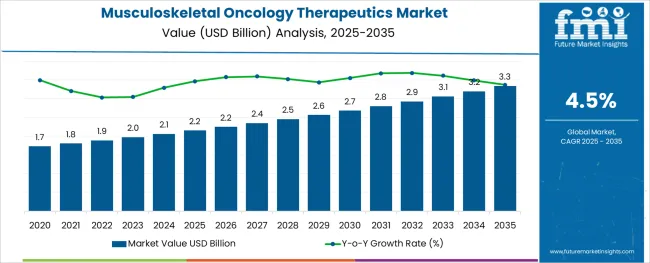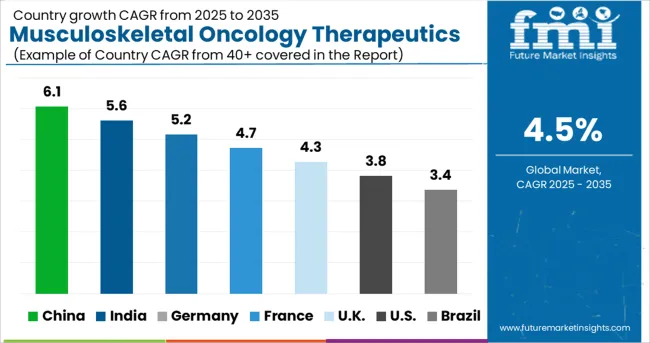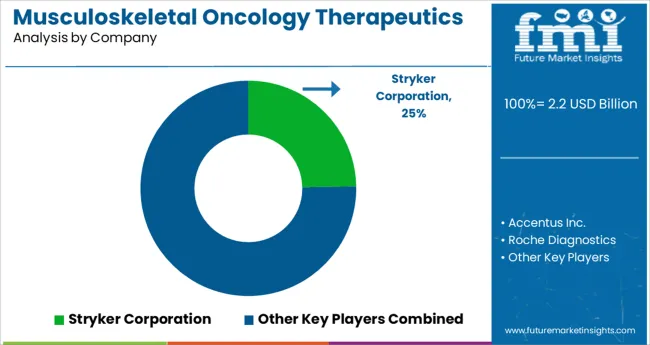The Musculoskeletal Oncology Therapeutics Market is estimated to be valued at USD 2.2 billion in 2025 and is projected to reach USD 3.3 billion by 2035, registering a compound annual growth rate (CAGR) of 4.5% over the forecast period.

The alginic acid market is undergoing consistent growth, propelled by rising demand from food processing, pharmaceutical formulations, and cosmetic applications. A growing focus on natural and sustainable ingredients in manufacturing processes has positioned alginic acid as a preferred biopolymer across industries.
The market is further supported by its diverse functional benefits, including water retention, gelling, and stabilizing properties, which make it indispensable in high-performance formulations. Increased regulatory acceptance of alginates as safe additives and the push towards cleaner labeling in food and personal care products have reinforced their adoption.
Ongoing innovation in extraction technologies and the utilization of algae as a renewable resource are paving the way for cost-effective production and expanded applications, ensuring sustained market expansion in the coming years.
The market is segmented by Diagnosis, Treatment, and End User and region. By Diagnosis, the market is divided into X-Ray, Magnetic resonance imaging (MRI) scan, Computed tomography (CT) scan, Positron emission tomography (PET) scan, and Biopsy. In terms of Treatment, the market is classified into Surgery, Amputation, Limb Salvage Surgery, Reconstructive Surgery, Chemotherapy, Radiation Therapy, Immunotherapy, and Targeted Therapy. Based on End User, the market is segmented into Multispecialty Hospitals, Cancer Research Institutes, and Diagnostic Centers. Regionally, the market is classified into North America, Latin America, Western Europe, Eastern Europe, Balkan & Baltic Countries, Russia & Belarus, Central Asia, East Asia, South Asia & Pacific, and the Middle East & Africa.
When segmented by salts, sodium alginate is expected to command 27.5% of the market revenue in 2025, marking it as the leading subsegment in this category. This leadership has been driven by its superior solubility, ease of incorporation into formulations, and versatility in a wide range of applications.
Its ability to form stable gels and maintain viscosity under varying conditions has made it highly sought after in both food and pharmaceutical sectors. Manufacturers have prioritized sodium alginate due to its consistent performance, cost-effectiveness, and regulatory acceptance, which have collectively strengthened its position.
The segment’s prominence has also been enhanced by its adaptability to evolving consumer preferences for plant-derived and sustainable ingredients, reinforcing its market share.
Segmented by end user industry, the food industry is projected to hold 33.0% of the market revenue in 2025, positioning it as the most prominent sector. This dominance has been shaped by the industry’s increasing reliance on alginic acid and its derivatives to deliver desirable textures, stabilize emulsions, and improve shelf life of processed foods.
As consumer demand for clean label and natural additives has intensified, the food sector has responded by integrating alginates into bakery, dairy, and confectionery products. Enhanced production efficiency and compliance with food safety standards have further encouraged widespread use.
The segment’s leadership has also been supported by product differentiation strategies where alginates contribute to premium quality and innovation, securing their role in modern food formulations.
Chondrosarcoma is more prevalent than other form of cancers and swift diagnosis and effective treatment remains a challenge for healthcare providers. Treatment with chemotherapy and radiotherapy do not remain the preferred choice of treatment in treating such type of tumor as clinical studies demonstrate no substantial improvements in the survival rate of the patients.
Therefore, adequate surgical resection is the mainstay of treatment in case of chondrosarcoma. As estimated by the American Cancer Society, chondrosarcomas is more prevalent with 40% of cases developing in adults whereas less than 5% of cases occur in patients who are less than 20 years old.
Radiofrequency ablation has become the standard and most preferred choice of treatment in case of osteoid osteoma, a benign bone tumor that arises from osteoblasts. However, studies demonstrates its expanded application in palliative treatment of patients with painful bone metastasis.
The ability to perform less invasive procedures often allows more efficient, less painful, and more cost-effective patient care. In addition, minimally invasive techniques, such as kyphoplasty, vertebroplasty, and acetabuloplasty may provide an alternative to major reconstructive surgery for patients with metastatic disease.
One of the prime factors driving the global musculoskeletal oncology therapeutics market includes rapidly ageing population with increasing risk of developing cancer. Patients who had prior high-dose external radiation therapy or treatment with anti-cancer drugs are at higher risk of developing osteosarcoma.
However, a small number of bone cancers also develop due to heredity defects of bones; people with metal implants, which doctors sometimes use to repair fractures, are more likely to develop osteosarcoma. In case of soft tissue sarcoma, adults with heredity disorders such as retinoblastoma, tuberous sclerosis, and Werner syndrome are at a higher risk of developing this type of cancer.
Development of safe and effective treatment procedures has also bolstered the growth of the musculoskeletal oncology therapeutics market. For example, image-guided surgery systems, primarily used in joints reconstruction, have been applied to orthopedic oncology.
This may prove beneficial for areas such as the pelvis, where the complex anatomy makes the functional result difficult to interpret. Also, increasing focus of orthopedic oncologists to integrate advances in the surgical techniques by collaboration with subspecialties is also expected to boost the growth of the market during the forecast period, 2020-2029.
Unwanted complications associated with the radiation therapy, such as increased risk of wound complications and of post radiation fractures is hampering the musculoskeletal oncology therapeutics market growth. Additionally, high cost associated with the treatment and lack of awareness regarding the effective treatment therapies can also pose challenges to adoption during the forecast period.
In the past few years, significant advancements have been made in treatment of musculoskeletal oncology related disorders. Yet, there is an urgent need to develop more sophisticated and highly advanced techniques to best manage hard-to-treat osteosarcomas.
Rising prevalence of musculoskeletal disorders is expected to increase emphasis on developing effective treatment procedures for cancers related to bones and soft tissues. Owing to these factors, the musculoskeletal oncology therapeutics market is expected to expand at a healthy growth rate during the forecast period.

On the basis of region presence, musculoskeletal oncology therapeuticsmarket is segmented into seven key regions: North America, Latin America, and Eastern Europe, Western Europe, and Asia pacific excluding Japan (APEJ), Japan, Middle East and Africa.
Europe and North America are the largest markets for musculoskeletal oncology therapeutics, owing to increased R&D investments and high level of awareness among end-users. Asia pacific represents immense growth opportunity for musculoskeletal oncology therapeutics market, owing to high population and increase in the prevalence of cancer.

Key market players in the musculoskeletal oncology therapeutics market are Stryker Corporation, Accentus Inc., Roche Diagnostics, Amgen Inc., Novartis AG, Biogen dec,GlaxoSmithKline,Sanofi S.A.,and Pfizer Inc.
The research report presents a comprehensive assessment of the market and contains thoughtful insights, facts, historical data, and statistically supported and industry-validated market data.
It also contains projections using a suitable set of assumptions and methodologies. The research report provides analysis and information according to categories such as market segments, geographies, types, technology and applications.
The report is a compilation of first-hand information, qualitative and quantitative assessment by industry analysts, inputs from industry experts and industry participants across the value chain.
The report provides in-depth analysis of parent market trends, macro-economic indicators and governing factors along with market attractiveness as per segments. The report also maps the qualitative impact of various market factors on market segments and geographies.
The global musculoskeletal oncology therapeutics market is estimated to be valued at USD 2.2 billion in 2025.
It is projected to reach USD 3.3 billion by 2035.
The market is expected to grow at a 4.5% CAGR between 2025 and 2035.
The key product types are x-ray, magnetic resonance imaging (mri) scan, computed tomography (ct) scan, positron emission tomography (pet) scan and biopsy.
surgery segment is expected to dominate with a 41.8% industry share in 2025.






Our Research Products

The "Full Research Suite" delivers actionable market intel, deep dives on markets or technologies, so clients act faster, cut risk, and unlock growth.

The Leaderboard benchmarks and ranks top vendors, classifying them as Established Leaders, Leading Challengers, or Disruptors & Challengers.

Locates where complements amplify value and substitutes erode it, forecasting net impact by horizon

We deliver granular, decision-grade intel: market sizing, 5-year forecasts, pricing, adoption, usage, revenue, and operational KPIs—plus competitor tracking, regulation, and value chains—across 60 countries broadly.

Spot the shifts before they hit your P&L. We track inflection points, adoption curves, pricing moves, and ecosystem plays to show where demand is heading, why it is changing, and what to do next across high-growth markets and disruptive tech

Real-time reads of user behavior. We track shifting priorities, perceptions of today’s and next-gen services, and provider experience, then pace how fast tech moves from trial to adoption, blending buyer, consumer, and channel inputs with social signals (#WhySwitch, #UX).

Partner with our analyst team to build a custom report designed around your business priorities. From analysing market trends to assessing competitors or crafting bespoke datasets, we tailor insights to your needs.
Supplier Intelligence
Discovery & Profiling
Capacity & Footprint
Performance & Risk
Compliance & Governance
Commercial Readiness
Who Supplies Whom
Scorecards & Shortlists
Playbooks & Docs
Category Intelligence
Definition & Scope
Demand & Use Cases
Cost Drivers
Market Structure
Supply Chain Map
Trade & Policy
Operating Norms
Deliverables
Buyer Intelligence
Account Basics
Spend & Scope
Procurement Model
Vendor Requirements
Terms & Policies
Entry Strategy
Pain Points & Triggers
Outputs
Pricing Analysis
Benchmarks
Trends
Should-Cost
Indexation
Landed Cost
Commercial Terms
Deliverables
Brand Analysis
Positioning & Value Prop
Share & Presence
Customer Evidence
Go-to-Market
Digital & Reputation
Compliance & Trust
KPIs & Gaps
Outputs
Full Research Suite comprises of:
Market outlook & trends analysis
Interviews & case studies
Strategic recommendations
Vendor profiles & capabilities analysis
5-year forecasts
8 regions and 60+ country-level data splits
Market segment data splits
12 months of continuous data updates
DELIVERED AS:
PDF EXCEL ONLINE
Oncology Based Molecular Diagnostics Market Size and Share Forecast Outlook 2025 to 2035
Oncology Blood Testing Market Size and Share Forecast Outlook 2025 to 2035
Oncology-Based In-vivo CRO Market - Growth & Emerging Trends 2025 to 2035
Oncology Nutrition Market Insights - Trends & Growth Forecast 2025 to 2035
Oncology Information Systems Market Analysis - Trends & Forecast 2025 to 2035
Oncology Apoptosis Modulators Market Insights – Forecast 2025 to 2035
The Oncology Adjuvants Market is segmented by Application, Indication and End User from 2025 to 2035
Oncology Imaging Software Market – Growth, Demand & Forecast 2025 to 2035
Immuno Oncology Assay Market Size and Share Forecast Outlook 2025 to 2035
Generic Oncology Drugs Market Growth – Industry Forecast 2025 to 2035
Sterile Oncology Injectable Market
Clinical Oncology Next-generation Sequencing Market Analysis - Size, Share, and Forecast 2025 to 2035
Immunology-oncology ELISA Kits Market Analysis - Size, Share & Forecast 2025 to 2035
Orthopedic Oncology Market Growth - Trends & Forecast 2025 to 2035
Paediatric Oncology Therapeutics Market Size and Share Forecast Outlook 2025 to 2035
Europe and MENA Generic Oncology Drug Market Size and Share Forecast Outlook 2025 to 2035
Biotherapeutics Virus Removal Filters Market Trends – Growth & Forecast 2025 to 2035
COPD Therapeutics Market Report – Growth, Demand & Industry Forecast 2023-2033
Digital Therapeutics and Wellness Market Size and Share Forecast Outlook 2025 to 2035
Digital Therapeutics Market Size and Share Forecast Outlook 2025 to 2035

Thank you!
You will receive an email from our Business Development Manager. Please be sure to check your SPAM/JUNK folder too.
Chat With
MaRIA